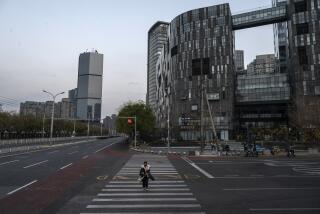CIA Sees China Facing Renewed Unrest : Economy: The austerity campaign launched in 1988 to stem inflation has angered workers and worsened unemployment, the U.S. report says.
- Share via
WASHINGTON — The CIA, in a strikingly gloomy portrait of the situation in China, said Thursday that the world’s most populous country faces the prospect of renewed social unrest because of angry workers and mounting unemployment.
In its annual report to Congress on the Chinese economy, the CIA said that chances for a quick return to the market-oriented reforms of the 1980s are “dim” and that the country’s social stability is “tenuous.” Unemployment in China is now at its highest level in a decade and urban living standards are declining, it said.
The CIA report directly contradicts the repeated public claims of the Chinese regime that the reforms continue and that the political climate there is calm. On Monday, the day China allowed renowned dissident Fang Lizhi to leave the country, Premier Li Peng spoke glowingly of what he called the “growing political and economic stability in China.”
The U.S. intelligence report, however, suggests that if there is new disorder in China, it may come not from the Chinese students and intellectuals who spearheaded last year’s pro-democracy demonstrations in Beijing’s Tian An Men Square, but rather from masses of disgruntled workers and jobless migrants.
“According to many accounts, layoffs have created an embittered and volatile class of unemployed,” the CIA asserted in a section entitled “Economic Problems Threaten Social Stability.”
”. . . The growing number of unemployed and underemployed poses a social problem, whether they return to the countryside or stay in the cities. In addition to disturbances in the workplace, the growing pool of idle workers has produced a rise in the level of crime nationwide.”
According to the CIA, China is being forced to devote increasing resources to the job of maintaining order.
For example, the intelligence agency explained, although the regime is increasing defense spending by more than 15% this year, “a significant portion of the increase . . . will go to purchasing new equipment, such as riot-control gear for military rapid-reaction units, and repaying the operational costs incurred by the military in enforcing martial law in Beijing and Lhasa during 1989.”
China’s economic problems stem from an austerity campaign launched by the regime in the fall of 1988. In an effort to reduce inflation, the leadership in Beijing clamped down on bank credit, cut back on investment projects, reimposed some price controls and brought to a halt the efforts to let prices be determined by market forces.
The CIA said that China’s drive succeeded in slowing down inflation, which dropped from annual rates of nearly 30% in late 1988 to less than 5% early this year. But the intelligence agency said that the austerity program was so restrictive that it “caused China’s worst economic slump in a decade.”
“Workers are disgruntled, because they believe they are bearing the brunt of Beijing’s austerity measures; many are receiving only about 70% of their expected wages and no bonuses, which have traditionally accounted for about one-third of workers’ incomes,” the CIA declared.
”. . . Some workers have complained that the current belt-tightening is the worst they have experienced since the early 1960s, when China was recovering from the disastrous Great Leap Forward.”
The CIA contended that China’s austerity program has treated only the symptoms of China’s economic instability, rather than the underlying cause--the fact that the reform program launched a decade ago under the leadership of Deng Xiaoping was stopped halfway before it achieved the efficiencies of a market economy.
Over the last few years, the CIA said, a number of economic reforms have been either frozen or “abandoned,” including proposed changes in China’s pricing system, banking, bankruptcy and foreign trade policies.
“Political support for reform has been weakened by leadership squabbling and the removal of two reform-minded party general secretaries in the past three years,” said the intelligence agency. It was referring to the Chinese Communist Party’s ouster of party secretary Hu Yaobang in 1987 and of his successor, Zhao Ziyang, after the upheavals in Beijing last year.
“While it is unlikely that many senior officials want to return to the command economy and isolationist policies that dominated China before 1979, there are those in the leadership who want to place strict limits on the non-state sector and to increase the party’s role in enterprise management.”
During a hearing on the CIA report Thursday by the congressional Joint Economic Committee, one scholar, Nicholas R. Lardy of the University of Washington, disputed the agency’s contention that China’s economic reforms are being abandoned. Although China is now in a serious economic slump, Lardy said, “there has been very little evidence of a wholesale retreat from the reform measures adopted a decade ago.”
Another scholar, Harvard University Prof. Dwight H. Perkins, argued that for the moment, China is so paralyzed that it has no economic policy.
“Those making economic policy are waiting for the fundamental questions of who will rule to be resolved,” Perkins said. “And those currently ruling are reluctant to move for fear of a popular reaction that would undermine their ability to rule.”
More to Read
Sign up for Essential California
The most important California stories and recommendations in your inbox every morning.
You may occasionally receive promotional content from the Los Angeles Times.










